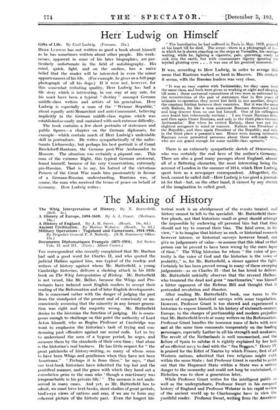Heir . Ludwig on Himself
Gifts of Life. By Emil Ludwig. (Putnam. 21s.) .
HERR LUDWIG- has not written as good a book about himself as he has sometimes written about other people. His weak- nesses, apparent in some of his later biographies, are par- ticularly unfortunate in the field of autobiography. , His mind, quick, light, and- - on the surface, . has . a naive belief that the reader will be interested in even the minor appurtenances of his-life. (For example, he gives us a full-page photograph of all his dogs.) If it were not, however, for this somewhat irritating quality, Herr Ludwig has had a life story which is interesting, in one way at any rate, for his must have been a typical " destiny " amongst German middle-class writers and artists of his. generation. Herr Ludwig is especially a man of the " Weimar • Republic," about equally anti-Monarchist and anti-Communist, believing implicitly in the German middle-class regime which was established so easily and sustained with such extreme difficulty.
The book contains a few short portraits of statesmen and public figures—a chapter on the German diplomats, for example—which contain much of Herr Ludwig's undeniable skill in portraiture. He writes sympathetically, of, the unfor- tunate Liehnowsky, but perhaps his best portrait is of Count Brockdorff-Rantzau, the German post-War Ambassador to Moscow. The situation was certainly a piquant one. This man of the extreme Right, this typical German aristocrat, found himself, because of his very Conservatism, extremely pro-Russian. That is to say, his hatred of the victorious Powers of the Great War made him passionately . in favour of a German-Russian understanding. Rantzau was, of course, the man who received the terms of peace on behalf of Germany. Herr Ludwig writes : " The humiliation he had suffered in i"aris:in May 190, gnawed
at heart till he died.- The scene—there is a photograph of it— in which he is shown.standing on the steps at Versailles, his carriage waiting, while he, lighting a cigarette, pale, quivering, ready to sink into_ the earth, but with consummate dignity ignoring the myriad- gloating eyes . . . - it was one of his greatest' moments."
• It was, according to Herr Ludwig, in order to avenge this • seene that Rantzau worked so hard in 'Moscow. His contact it seems, with the Russian leaders was very close. _ •
" It was an 'easy matter with: Tschissoldry; for. they- cause .front the same class, and both were given to working at night and-sleeping till noon ; these nocturnal committees of two were so enlivened by the eccentricities of the pair of statesmen that in five years of intimate co-operation they never lest faith iii one another, cleipite the constant friction between their -countries. But it Was the.same with Kalinin, for like a true aristocrat Rantzau demanded rank and long descent from no one but himself. One of his colleagues once heard him vehemently exclaim : I am Count Rantzau first, and then again Count Rantzau, and only in the third place German Ambassador.' • Hitt - when he visited Kalinin, there was not the slightest arrogance in mind or manner. Kalinin was President of the Republic, and then again President of the Republic, and only in the third pliee a-peasant's-son: Hence -even among intimates Rantzau never permitted - sarcasms about these self-made men, who are not grand enough for some middle-class upstarts."
_ There is an extremely sympathetic. sketch of Stresetnann, who was certainly the real hero of the author's Germany. There are also a good many passages about England, almost all of a flattering character, the most interesting being the account of London in the summer of 1914, which Herr Ludwig spent here as a newspaper correspondent.. Altogether, the book cannot be called dull—-terrLuchaig is too good a journal- ist for that—but, on the other hand, it cannot by any stretch of the imagination be called good.










































 Previous page
Previous page